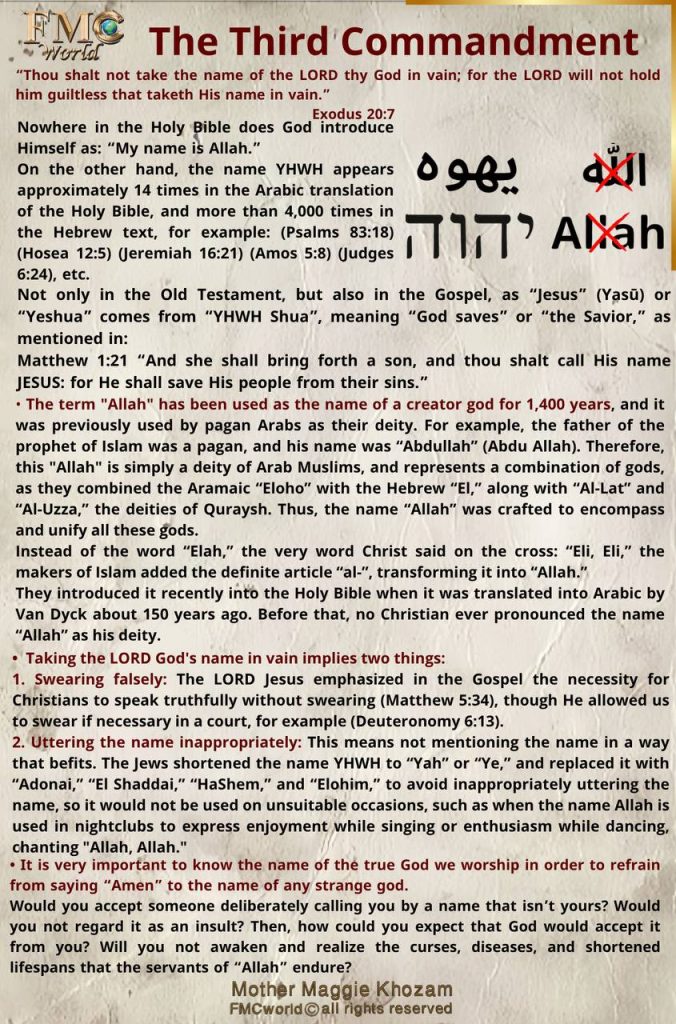

The third commandment is found in Exodus 20:7 “Thou shalt not take the name of the LORD thy God in vain; for the LORD will not hold him guiltless that taketh His name in vain.”
Before elucidating the word “in vain,” we must first know what the true name of God is. Nowhere in the Holy Bible does God introduce Himself as: “My name is Allah.” Rather, He revealed His name to His prophets as a name that we have been forbidden to utter in Arabic in order to become servants of (Allah), “the pagan god of Quraysh and the one who sent Muhammad, the prophet of the Muslims.”
To begin revealing the hidden truth, we must go back to the Holy Bible. When the LORD God appeared to Moses in a flame of fire out of the midst of a bush, the Book of Exodus 3:15 records: “ And God said moreover unto Moses, Thus shalt thou say unto the children of Israel, YHWH, The LORD God of your fathers, the God of Abraham, the God of Isaac, and the God of Jacob, hath sent me unto you: this is My name for ever, and this is My memorial unto all generations.”
The name YHWH appears approximately 14 times in the Arabic translation of the Holy Bible. However, if we search for the name in the Hebrew Bible, we will find it mentioned more than 4,000 times, as in:
Psalms 83:18 “That men may know that thou, whose name alone is YHWH, art the most high over all the earth.”
Jeremiah 16:21 “Therefore, behold, I will this once cause them to know, I will cause them to know mine hand and my might; and they shall know that my name is YHWH.”
Hosea 12:5 “Even the LORD God of hosts; YHWH is His memorial.”
Amos 5:8 “Seek Him that maketh the seven stars and Orion, and turneth the shadow of death into the morning, and maketh the day dark with night: that calleth for the waters of the sea, and poureth them out upon the face of the earth: YHWH is His name”
Jeremiah 33:2 “Thus saith the LORD the maker thereof, the LORD that formed it, to establish it; YHWH is His name;”
Judges 6:24 “Then Gideon built an altar there unto the LORD, and called it YHWH Shalom: unto this day it is yet in Ophrah of the Abiezrites.”
Turning to the New Testament, to Jesus Christ, “Jesus” (Yasū) or “Yeshua” comes from “YHWH Shua”, meaning “God saves” or “the Savior,” as mentioned in:
Matthew 1:21 “And she shall bring forth a son, and thou shalt call His name JESUS: for He shall save His people from their sins.”
Today, we also notice that our children’s names are still associated with the name “YHWH,” such as:
• “Yuhanna” (John) – meaning “YHWH is gracious.”
• “Elijah” – meaning “My God is YHWH.”
• “Abiah” (Abijah) – meaning “My father is YHWH.”
This connection extends to the word “Hallelujah,” which is repeated in churches without an understanding of its meaning; it means “Hallelu Yah” (Praise Yah), that is, “Praise YHWH.” The syllables “Ya” and “H” are abbreviations of the name “YHWH” in Hebrew.
The question is now: Did the name “YHWH” originate just 3,500 years ago, since the LORD revealed it to Moses?
The answer, of course, is: “No.”
In Genesis 22 “13 … and Abraham went and took the ram, and offered him up for a burnt offering in the stead of his son.
14 And Abraham called the name of that place YHWH-Jireh: as it is said to this day, In the mount of the LORD it shall be seen.”
And even before Moses, the name was mentioned by Leah in:
Genesis 29:35 “And she conceived again, and bare a son: and she said, Now will I praise the LORD: therefore she called his name Judah;” the name Judah (Yehuda) means “Praise to God.”
Also, the name of Moses’ mother, as mentioned in the Book of Numbers 26:59 “And the name of Amram’s wife was Jochebed,” the name Jochebed (Yokebed) means “The glory of YHWH.”
Thus, the name YHWH had been revealed since ancient times to the prophets of Israel, yet it was not commonly used among the general people. The name most widely used was “the Almighty” (El Shaddai), meaning “the All-Powerful God,” as stated in:
Exodus 6:3 “And I appeared unto Abraham, unto Isaac, and unto Jacob, by the name of God Almighty, but by my name YHWH was I not known to them.”
Genesis 17:1 “And when Abram was ninety years old and nine, the LORD appeared to Abram, and said unto him, I am the Almighty God; walk before me, and be thou perfect.”
Thus, “God Almighty” or “the Almighty” is an attribute of God, whereas “YHWH” is the name of the Creator God, the All-Powerful, whose attributes in the Holy Bible exceed one hundred.
As for the term “Allah,” it was inserted in the Holy Bible only recently, around 150 years ago, when it was translated into Arabic by Van Dyck. Before that, no Christian ever used the name “Allah,” except for the Arabian Peninsula’s Nasara who adopted it to conform with the idolaters of Quraysh and its surroundings during the pre-Islamic era, as they were—and their descendants still are—killing anyone who did not worship this “Allah,” who commanded them to kill all who do not believe in him.
The term “Allah” has been used as the name of a creator god for 1,400 years, and it was previously used by pagan Arabs as their deity. For example, the father of the prophet of Islam was a pagan, and his name was “Abdullah” (Abdu Allah), “the servant of Allah.” Therefore, this “Allah” is simply a deity of Arab Muslims, and it represents a combination of gods, that is, a blending of various gods’ names under the guise of monotheism. They combined the Aramaic “Eloho” with the Hebrew “El,” along with “Al-Lat” and “Al-Uzza,” the deities of Quraysh. Thus, the name “Allah” was crafted to encompass and unify all these gods.
Instead of the word “Elah,” the very word Christ said on the cross: “Eli, Eli,” and which appears hundreds of times in the Holy Bible, the makers of Islam added the definite article “al-”, transforming it into “Allah,” causing the listener to believe that “Elah” and “Allah” share the same root, without realizing that they are worshiping a pagan deity, that is vastly different from the true God.
It is worth noting that Van Dyck—the one who introduced the term “Allah” into the Arabic translation of the Holy Bible—received several awards from the Muslim Ottoman Sultan for doing so. It should not be hidden from any Christian that he enlisted Sheikh Yusuf al-Asir, a Muslim scholar from Al-Azhar, to assist him with linguistic editing (this explains much about the linguistic errors in the diacritics; it is not unlikely that these errors were deliberately inserted to create confusion and to cast doubts in the minds of Arabic-speaking readers of the Holy Bible.)Thus, we fully understand how and why the name “Allah” was placed instead of “Elah,” “Elohim,” or “El.”
Additionally, we also understand how Christians were made ignorant of their God in order to turn them into slaves of the Quraishi Allah; a step toward the greater plan of uniting humanity under the god of this world (Satan), as foretold in the Book of Revelation.
Now we return to the commandment to understand what it means not to “take the name of our God in vain.” Taking the LORD God’s name in vain implies two things: first, swearing falsely, and second, inappropriately uttering the name. The LORD God says in Leviticus 19:12 “And ye shall not swear by My name falsely, neither shalt thou profane the name of thy God: I am the LORD.”
Furthermore, in the Gospel, the LORD Jesus emphasized the necessity of refraining from swearing altogether,
Matthew 5 “34- … Swear not at all; neither by heaven; for it is God’s throne:
35- Nor by the earth; for it is his footstool : neither by Jerusalem; for it is the city of the great King.
36- Neither shalt thou swear by thy head, because thou canst not make one hair white or black.
37- But let your communication be, Yea, yea; Nay, nay: for whatsoever is more than these cometh of evil.”
Some might think they can swear falsely by Allah since it is merely the name of a pagan deity. However, God answers this in Joshua 23:7 “…neither make mention of the name of their gods, nor cause to swear by them, neither serve them, nor bow yourselves unto them”
And if we are ever required to swear in court or while testifying in a case, we are to swear truthfully by our God, as the LORD permitted in Deuteronomy 6:13 “Thou shalt fear the LORD thy God, and serve Him, and shalt swear by His name.”
As for the second meaning of the commandment, which is to refrain from inappropriately uttering the name, Jews ceased to pronounce the name YHWH altogether in order to avoid taking the name of the LORD in vain. Even in the Torah, the name was shortened to forms like “Yah” or “Ye,” as previously mentioned, in order to avoid unintentionally misusing it, (for example, in Arabic, they say “Subhanah,” meaning “glorified is he”, and here the “-h” refers to Allah.)
Similarly, the Jews replaced the name YHWH with “Adonai,” “El Shaddai,” “HaShem,” and “Elohim,” in order to avoid inappropriately uttering the name, as stated in Exodus 20:7 “…for the LORD will not hold him guiltless that taketh His name in vain.” Just as the word “Allah” in Arabic has come to be used during folk dabke dancing and in expressions of admiration during dancing in nightclubs, let alone the widespread blasphemy and profaning of the word “Allah” in Arabic.
This answers a question that some might have: Why did God allow Van Dyck and al-Bustani to change the name? The answer is simply to prevent us from using the name “YHWH” in an inappropriate manner, just as happens with the term “Allah.” Simultaneously, God “YHWH” left us clear scriptural references that point to His true name.
Freemasonry (or what is referred to as global powers) took advantage of verses in the Holy Bible referring to witnesses of God, for example, when the LORD God says: “You are My witnesses,” as stated in Luke 24:48 “And ye are witnesses of these things.” And the Jehovah’s Witnesses group was established. They made the name commonly used, but offensively, through a sect that distorts the Christian faith in that it resembles Islamic sects.
It is very important to know the name of the true God we worship in order to refrain from saying “Amen” to the name of any strange god. And do not assume that God will show you mercy if you continue to use the name of the idol “Allah,” for sin was not counted against you when you were unaware; nevertheless, now that you are aware, your sin remains.
Would you accept someone deliberately calling you by a name that isn’t yours? Would you not regard it as an insult? Then, how could you expect that God would accept it from you? Will you not awaken and realize the curses, diseases, and shortened lifespans that the servants of “Allah” endure?
August / 26 / 2020